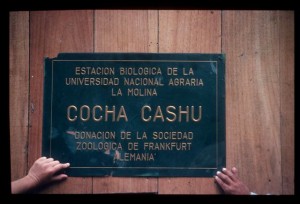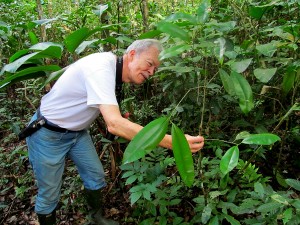 The idea of a biological station at Cocha Cashu was first conceived by Paul V. Pierret, Professor of National Parks and Wildlife at the National Agrarian La Molina University (UNALM) in Lima, in the late 1960’s. Marc Dourojeanni was his Peruvian counterpart. The idea was that the Institute for Forestry Research (of UNALM and the Forestry Service) would have a scientific base in the proposed Manu National Park. It was Rudolf Hofmann (visiting professor of the faculty), with the help of Augusto Tovar and students Manuel Rios (then student and later professor) and Jaime Evans who built the station with their own hands in 1969 (with funds from the Frankfurt Zoological Society). They were aided by the then Head of the Gran Parque Nacional Del Manu Reserve, Carlos Linares Bensimón, the first Head of Peru’s Protected Areas, and a boatdriver and carpenter from Pucallpa plus two workers from Boca Manu. Soon after, researchers and students from La Molina, amongst which Rudolf Hoffman as well as Augusto Tovar and Kai Otte (of the Frankfurt Zoological Society), came to Cashu to carry out studies on various themes, especially the black caiman. Manu National Park was formally established four years later, in 1973.
The idea of a biological station at Cocha Cashu was first conceived by Paul V. Pierret, Professor of National Parks and Wildlife at the National Agrarian La Molina University (UNALM) in Lima, in the late 1960’s. Marc Dourojeanni was his Peruvian counterpart. The idea was that the Institute for Forestry Research (of UNALM and the Forestry Service) would have a scientific base in the proposed Manu National Park. It was Rudolf Hofmann (visiting professor of the faculty), with the help of Augusto Tovar and students Manuel Rios (then student and later professor) and Jaime Evans who built the station with their own hands in 1969 (with funds from the Frankfurt Zoological Society). They were aided by the then Head of the Gran Parque Nacional Del Manu Reserve, Carlos Linares Bensimón, the first Head of Peru’s Protected Areas, and a boatdriver and carpenter from Pucallpa plus two workers from Boca Manu. Soon after, researchers and students from La Molina, amongst which Rudolf Hoffman as well as Augusto Tovar and Kai Otte (of the Frankfurt Zoological Society), came to Cashu to carry out studies on various themes, especially the black caiman. Manu National Park was formally established four years later, in 1973.
 Cocha Cashu has hosted researchers from all over the world in a variety of disciplines. Dr. John Terborgh, Professor of Environmental Sciences at Duke University and an eminent authority on tropical ecology, operated the station (under the auspices of the Peruvian government) for more than 30 years, and personally conducted research on such diverse topics as primates, birds, jaguars and forest composition. During the first years of Dr. Terborgh’s management the original station was destroyed by the natural fall of a huge tree; John reconstructed the station along the same design. Over the years, his research and those of other investigators have produced an impressive body of work, resulting in over 750 publications.
Cocha Cashu has hosted researchers from all over the world in a variety of disciplines. Dr. John Terborgh, Professor of Environmental Sciences at Duke University and an eminent authority on tropical ecology, operated the station (under the auspices of the Peruvian government) for more than 30 years, and personally conducted research on such diverse topics as primates, birds, jaguars and forest composition. During the first years of Dr. Terborgh’s management the original station was destroyed by the natural fall of a huge tree; John reconstructed the station along the same design. Over the years, his research and those of other investigators have produced an impressive body of work, resulting in over 750 publications.
Today, the Station is under new management. In 2011, San Diego Zoo Global signed a 10-year Memorandum of Understanding with the National Service for Natural Areas Protected by the State (SERNANP), thus launching a new era for Cocha Cashu
